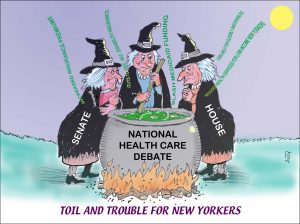CSEA is carefully watching as federal lawmakers continue to discuss the future of health care.
Recently, the U.S. Senate voted against several bills to repeal and/or replace the U.S. Patient Protection and Affordable Care Act (ACA), months after the U.S. House of Representatives approved such legislation.
The rejected legislation would have been devastating for New Yorkers; these plans would have left those most in need of affordable health care without access to these vital services.
The most recent legislation included a plan to convert Medicaid payments to a “per cap” system, which means that each state would get a set amount per individual on Medicaid.
These changes would have cost New York state billions of dollars annually, which would have had drastic effects on state hospitals, the Office of Mental Health (OMH) and People with Developmental Disabilities (OPWDD), and many health programs operated by local governments. In addition, the proposal would have phased out the Medicaid expansion program over a three-year period starting in 2021.
This change would result in fewer low-income New Yorkers qualifying for health insurance.
The House version of the bill also included cuts to Medicaid and other programs that would have millions of New Yorkers without health care. While the Affordable Care Act and Medicaid funding remain intact for now, the health care debate may not be over.
Congress is expected to revisit passing health care legislation later this year.
— Janice Gavin



